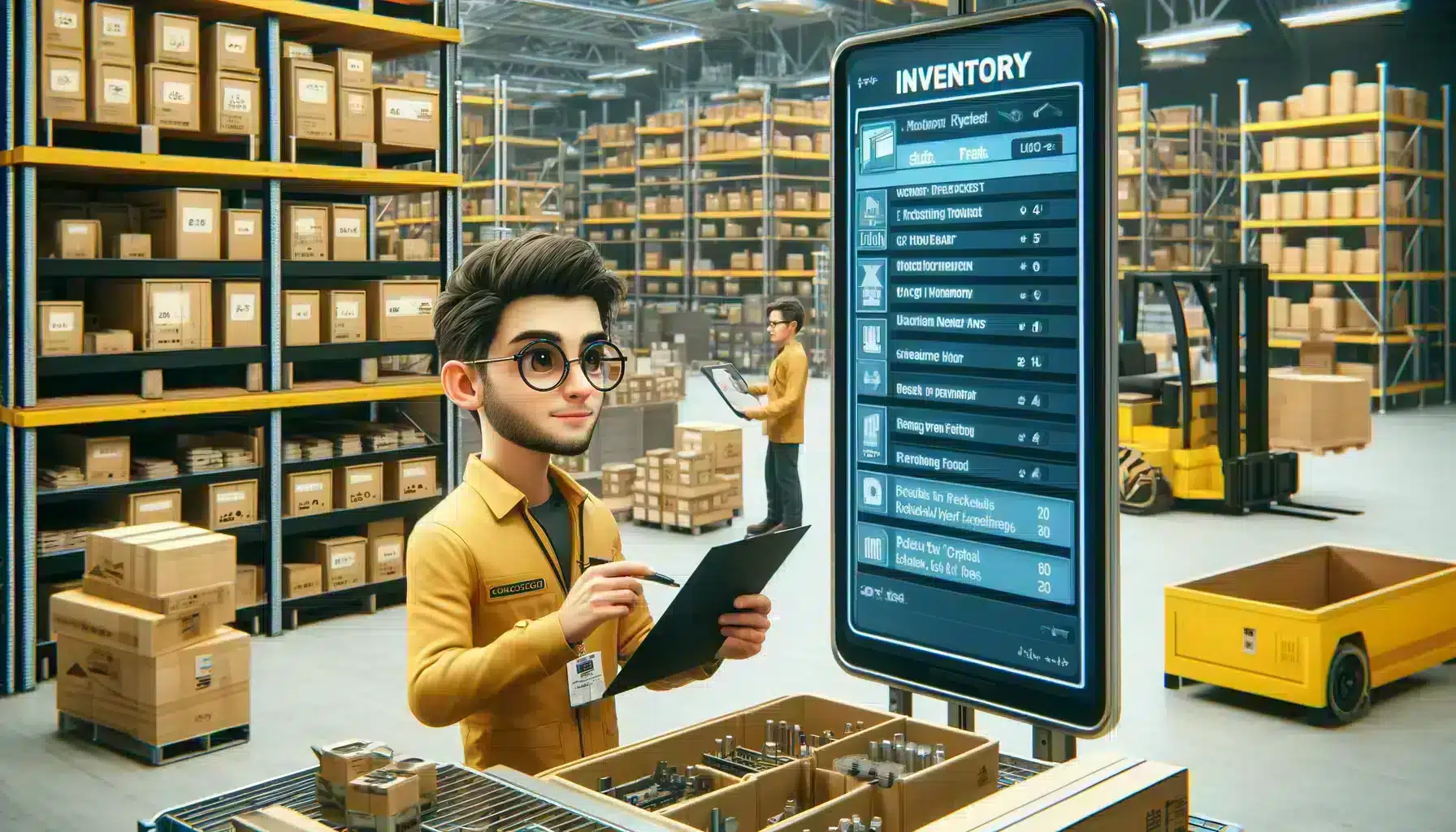Interview questions : storekeeper
Discover key questions for a storekeeper interview, along with exemplary answers by Marlon. Get insights on stock management, management systems, safety, and more.
Description
Questions for a storekeeper interview
- What experience do you have in managing a warehouse or stock?
- Can you tell me about a stock management system you have used in the past?
- How do you organize your work day to ensure effective warehouse management?
- Have you ever faced an out-of-stock problem? How did you handle that situation?
- How do you react to an emergency in the warehouse, like damaged goods or an urgent order?
- What methods do you use to minimize errors in inventory?
- How do you ensure safety in the warehouse?
- Do you have experience with lifting equipment or other warehouse machinery?
- How do you handle returns of goods and defective products?
- What practices do you employ to optimize storage space?
- How do you stay up-to-date with the best practices in warehouse management?
- Can you give me an example of when you had to work as a team to solve a warehouse problem?
- How important do you consider data accuracy in inventory?
- What challenges have you faced in your previous roles and how did you overcome them?
- Why do you want to work for our company as a store keeper?
Some answers by Marlon
- What experience do you have in managing a warehouse or stock?
“I have several years of experience managing the inventory of raw materials, finished products, and spare parts at a large manufacturing company. My role involves coordinating with various departments to ensure smooth production processes. Over the years, I’ve learned how to effectively manage large inventories and handle the logistical challenges that come with it.” - Can you describe a stock management system you’ve previously worked with?
“I have extensive experience with SAP Inventory Management. This system has enabled me to keep accurate records and streamline the inventory tracking process. I’ve used it to monitor stock levels, generate reports, and support decision-making processes regarding stock reordering and allocation.” - How do you organize your work day to ensure effective warehouse management?
“My day typically starts with a review of the inventory reports and a walk-through of the warehouse to inspect any pending issues. I prioritize tasks based on urgency, such as restocking materials needed for production first. Throughout the day, I maintain close communication with the production and procurement departments to adjust plans as necessary.” - Have you ever faced an out-of-stock situation? How did you manage it?
“Yes, I’ve encountered out-of-stock situations, particularly during unexpected spikes in production demand. In such cases, I work closely with the procurement team to expedite orders while communicating transparently with the production team about realistic timelines for material availability.” - How do you handle emergencies in the warehouse, such as damaged products or urgent orders?
“In cases of emergencies like damaged goods or urgent orders, I prioritize these issues to prevent any disruption in the production line. This involves reallocating resources to address the urgent needs and collaborating with the relevant departments to resolve the issues efficiently.” - What methods do you use to minimize inventory errors?
“To minimize errors, I rely on regular audits, use scanning technology for tracking incoming and outgoing items, and ensure all team members are trained on proper procedures. This helps maintain accuracy in inventory records and reduces the chances of errors.” - How do you ensure safety in the warehouse?
“Safety is a priority in my role. I ensure compliance with all safety protocols and regularly conduct safety drills. Additionally, I make sure all equipment is properly maintained and that staff are trained in safety practices, including the correct use of personal protective equipment.” - Do you have experience with warehouse machinery such as forklifts?
“Yes, I am trained and certified to operate various warehouse machinery, including forklifts. This experience is crucial for handling the physical aspects of warehouse management safely and effectively.” - How do you manage returned goods and defective products?
“I oversee a systematic process for handling returns and defective items, which includes logging these items into our system, coordinating with quality control for inspection, and ensuring proper storage or disposal based on the quality assessment.” - What strategies do you use to optimize warehouse space?
“To optimize space, I regularly analyze storage patterns and adjust the layout to accommodate inventory fluctuations and seasonal changes. This involves strategic placement of goods to enhance accessibility and efficiency.” - How do you keep up with the latest warehouse management practices?
“I stay updated by attending workshops, participating in industry seminars, and subscribing to relevant professional journals. This helps me implement modern management techniques and improve our warehouse operations.” - Can you provide an example of teamwork in solving a warehouse issue?
“Once, during a major reorganization of the warehouse, I led a team to redesign the storage layout, which improved our operational efficiency and space utilization. This project required collaborative planning and execution with multiple departments.” - How important is data accuracy in your inventory management?
“Data accuracy is critical. Accurate inventory data helps in planning, reduces the risk of stockouts or overstocking, and ensures customer satisfaction by having the necessary items available when needed.” - What challenges have you faced in your previous roles and how have you overcome them?
“Handling peak season demands has been a challenge. I’ve addressed this by developing robust inventory management strategies and enhancing coordination between departments to handle increased workload effectively.” - Why do you want to work for our company as a storekeeper?
“I am impressed by your company’s commitment to innovation and quality. I believe my skills and experiences align well with your company’s goals, and I am excited about the opportunity to contribute to your team.”
Tips to Hire a Storekeeper: Key Interview Questions and Qualities to Look For
Hiring the right storekeeper is crucial for ensuring smooth warehouse operations and effective inventory management. A storekeeper not only manages stock but also plays a key role in maintaining order, minimizing errors, and ensuring safety in the workplace. To help you make the best hiring decision, here are some essential tips and questions to consider when interviewing candidates for a storekeeper position. This guide will help you assess their qualifications, experience, and abilities, ensuring you hire the best fit for your company.
1. Assessing Inventory Management Experience
The first step in evaluating a potential storekeeper is to assess their experience in inventory management. Ask candidates to describe their previous roles managing inventory, especially if it involves working in industries similar to yours. Look for specific examples of how they handled large or complex inventories, and whether they have dealt with both raw materials and finished goods.
Interview question:
“What experience do you have in managing a warehouse or stock?”
Why it matters:
Experience in managing inventory is key because storekeepers often coordinate with different departments such as procurement, production, and sales. A well-rounded candidate will have experience managing inventory levels, avoiding overstock or stockouts, and ensuring that stock is easily accessible when needed.
2. Proficiency with Stock Management Systems
In today’s digital world, it’s essential that storekeepers are proficient with stock management software systems. These systems help ensure accuracy in inventory tracking, minimize human error, and streamline warehouse operations. The candidate should be familiar with widely-used systems such as SAP, Oracle, or other inventory management tools.
Interview question:
“Can you describe a stock management system you’ve previously worked with?”
Why it matters:
Storekeepers must be able to quickly adapt to or already have experience with the inventory management system your company uses. Candidates who are proficient with software will be able to reduce errors and improve the efficiency of stock tracking, reordering, and reporting.
3. Organizational and Time Management Skills
A great storekeeper needs excellent organizational skills to manage the flow of inventory, paperwork, and multiple tasks throughout the day. Their ability to prioritize tasks effectively can make the difference between smooth operations and costly delays.
Interview question:
“How do you organize your workday to ensure effective warehouse management?”
Why it matters:
You want to ensure that your future storekeeper can manage their time wisely, handling the most urgent tasks first and preventing bottlenecks in the supply chain. An ideal candidate will demonstrate a strong ability to prioritize tasks based on urgency, while keeping long-term goals and daily workflows in mind.
4. Problem-Solving Under Pressure
Emergencies in the warehouse, such as out-of-stock situations or damaged goods, require quick thinking and immediate action. A great storekeeper must be able to stay calm under pressure and resolve problems swiftly to minimize disruption in the supply chain.
Interview question:
“Have you ever faced an out-of-stock problem or a warehouse emergency? How did you handle it?”
Why it matters:
Out-of-stock issues or urgent orders can have a ripple effect throughout your operations, potentially halting production. A candidate who can provide clear examples of problem-solving in these situations shows they can manage stress and work efficiently under pressure.
5. Error Minimization and Attention to Detail
Maintaining accurate stock levels is a critical part of a storekeeper’s job, and errors can lead to costly mismanagement of inventory. Ask candidates how they minimize errors in their day-to-day tasks and what techniques they use to keep inventory data accurate.
Interview question:
“What methods do you use to minimize errors in inventory?”
Why it matters:
Errors in inventory data can lead to overstocking, stockouts, or even financial losses. A candidate with a proven method for minimizing errors through regular audits, technology use, or employee training will help ensure your warehouse runs smoothly.
6. Ensuring Warehouse Safety
Safety in the warehouse is of paramount importance. Storekeepers must not only follow safety protocols themselves but also enforce them with their team. Inquire about the candidate’s understanding of safety standards and their experience in maintaining a safe warehouse environment.
Interview question:
“How do you ensure safety in the warehouse?”
Why it matters:
A safe warehouse reduces the risk of accidents, injuries, and costly damage to products or equipment. The candidate’s knowledge of safety protocols, equipment maintenance, and staff training demonstrates their ability to prioritize the well-being of the team and the business.
7. Experience with Warehouse Equipment and Machinery
Warehouse operations often involve the use of machinery such as forklifts, pallet jacks, or conveyor belts. Ensure that your storekeeper candidate has the necessary certifications and hands-on experience with this equipment.
Interview question:
“Do you have experience with lifting equipment or other warehouse machinery?”
Why it matters:
A candidate trained and certified in operating warehouse machinery can reduce the risk of accidents, improve efficiency, and handle the physical aspects of warehouse management more effectively. This ensures safe and smooth handling of goods.
8. Handling Returns and Defective Goods
A storekeeper must have a clear process for dealing with returns, defective products, and damaged goods. Ask candidates how they’ve managed returns and whether they work closely with quality control or other departments to ensure proper handling.
Interview question:
“How do you manage returns of goods and defective products?”
Why it matters:
Effective management of returned or defective goods prevents these items from cluttering up warehouse space or leading to accounting discrepancies. A candidate with a well-structured approach to handling these items will keep operations running smoothly.
9. Strategies for Warehouse Space Optimization
Optimizing warehouse space is essential for efficiency, especially in operations where space is limited or seasonal fluctuations in inventory are common. Ask how the candidate has optimized space in their previous roles and what strategies they use to make the best use of available storage.
Interview question:
“What practices do you employ to optimize storage space?”
Why it matters:
A storekeeper with experience in reorganizing layouts or implementing space-saving strategies will help your business maximize its storage potential, reduce bottlenecks, and ensure that goods are easily accessible.
10. Commitment to Continuous Improvement
Finally, it’s essential to hire a storekeeper who is committed to continuous learning and improvement. Warehouse management is constantly evolving, and staying up to date with new practices, tools, and safety regulations is key to long-term success.
Interview question:
“How do you stay up-to-date with the best practices in warehouse management?”
Why it matters:
Candidates who actively seek out professional development opportunities, whether through training, seminars, or industry publications, are more likely to bring fresh ideas and improvements to your warehouse operations.
Conclusion
Hiring the right storekeeper is essential for maintaining efficient and safe warehouse operations. By focusing on these key areas—inventory management experience, system proficiency, organizational skills, problem-solving, error minimization, safety, equipment use, returns handling, space optimization, and continuous improvement—you’ll be able to assess candidates effectively and choose someone who will help your warehouse run smoothly and efficiently.
When interviewing storekeeper candidates, use these tips to guide your questions and evaluate responses. A well-qualified storekeeper will bring organization, reliability, and innovation to your team, helping your business thrive in a competitive market.
Additional information
| Human Ressource | |
|---|---|
| Level | Technician |
| Department | Supply Chain |





